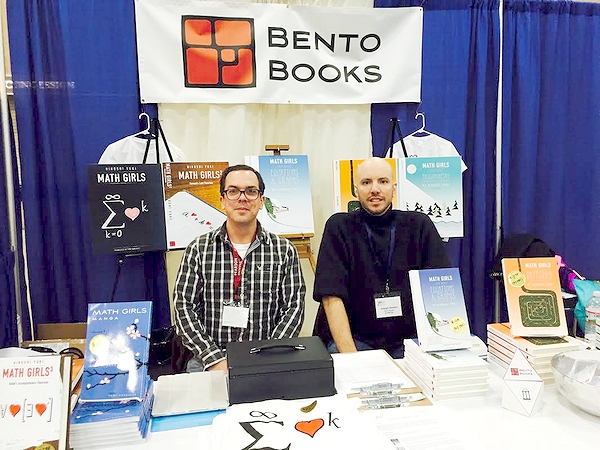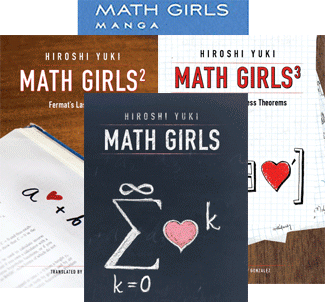July 14, 2015
Bento Books: A Translator-Driven Publisher
By Avery Fischer Udagawa
Alexander O. Smith, Tony Gonzalez, and Joseph Reeder founded Bento Books in 2011 to “bring contemporary Japanese fiction to new audiences.” The company has since published titles such as Math Girls by Hiroshi Yuki, translated by Gonzalez, and Cage on the Sea by Kaoru Ohno, translated by Giles Murray. Here the cofounders respond to questions from SWET about their history, activities, and vision.

Photo: Bento Books cofounders Tony Gonzalez (left) and Joseph Reeder at the 2015 Joint Mathematics Meeting in Houston, Texas.
Who are the founders of Bento Books? Before creating the company, how did you find each other? (Please introduce yourselves.)
Tony Gonzalez: Before Bento Books I had a varied career, including being a software developer, a high school math teacher, a university Japanese instructor, and of course a freelance translator. I met Alex at a game event in Tokyo in 1998 or 1999. I’m a pretty shy person, so I’m very grateful that he came up and introduced himself.
Joe Reeder: After working for three years at an investment bank in Tokyo, I was about ready to throw in the towel and move back to the United States, when a once-in-a-lifetime chance to work as a translator at Square Enix popped up. I first encountered Alex in 2002 as I was going in for that very interview, and he was turning in some resignation paperwork. No words were exchanged, only wary glances. We later met officially while working together on Final Fantasy X-2 at Square Enix.
 Alex O. Smith (photo at left): After a brief stint in academia, I worked for the game company Square as a translator and eventually went freelance. Joe and I had been working together as freelancers in the years after that, then we incorporated and were running a translation company, Kajiya Productions, when Tony suggested Bento Books.
Alex O. Smith (photo at left): After a brief stint in academia, I worked for the game company Square as a translator and eventually went freelance. Joe and I had been working together as freelancers in the years after that, then we incorporated and were running a translation company, Kajiya Productions, when Tony suggested Bento Books.
What turn(s) of events led to forming Bento Books?
TG: It started from a gripe session about how most translators don’t get the credit they deserve for the work they do. The rates are generally low, editorial support is often weak, deadlines are too harsh to allow quality work, and so on. So I said, “Well what’s to stop us from publishing books ourselves?”
What aspects set Bento Books apart from conventional publishers? From other unconventional publishers?
AOS: We’re trying to improve on some areas we see lacking at traditional publishers. Translators don’t always get copyright or royalties, when they should get both. Editors don’t always understand what a translation needs to get from one language to another intact and yet readable. By using editors who are also translators, and making our translators part of PR efforts, we hope to lead by example.
How would you describe your output until now? Do you foresee continuing in a similar direction, or shifting course?
TG: Most of the books we’ve published so far have been in the two series, Math Girls and Math Girls Talk About…, that I’m translating. These are niche titles particularly suited to me (I have a background in mathematics education, so translating these books combines several of my personal and professional interests), and I’ll likely be working on them for a few more years. Once those are all done, I have a list of other mathematics-related titles that I would love to do. But of course we don’t want Bento Books to become known as a publisher that specializes in math books.
AOS: We also have a joint publishing deal with the Japanese publisher Hayakawa, and have been working on their titles. So far we have a few in the works, and one published: Avatar Tuner. It’s the first volume in a five-volume series based on a video game.
 Who do you see as your market?
Who do you see as your market?
TG: I hope that we can straddle many markets. In particular, I most want to see us reaching readers who read our books because they’re good books, not because they’re Japanese books. That being said, aside from the math books the founders have a bias for speculative fiction and mysteries, so in the near term that’s where we’ll likely be putting most of our efforts.
Bento Books is surely a labor of love. What keeps you going?
TG: Well, the fact that it’s a labor of love, and not just labor, certainly motivates us. But also important is the hope that someday (hopefully in the near future) it won’t be just a labor of love any more. We’re actively searching for funding to build Bento Books up to the point where it becomes our day job, allowing us to quit the other work we have to pick up to support ourselves. Add to that a dash of the dream of stumbling across the elusive “Japanese Harry Potter.”
How does the Bento Books team select titles? And find translators?
AOS: Title selection comes from our own interests, and suggestions from our publishing partners like Hayakawa. For translators, we set a high bar. Producing a translation true to the intent of the original yet with a distinct authorial voice is not something many people can pull off. Our translators are people we’ve found and who’ve passed our short but challenging translation test.
Once acquired and translated, what editing/checking processes do Bento Books titles undergo?
JR: For most of the novels up until now, I’ve served as primary editor, with additional editorial passes by Tony and/or Alex depending on the title. As we’ve picked up more titles, however, it’s getting to the point where one person can’t really keep up with everything, so we’ve turned to outsource editors such as longtime collaborator Elye Alexander to help out. Then one of us goes over the edited manuscript for a final pass to iron out any lingering issues.
So at the moment, you don’t incorporate a Japanese-native check stage in your translation process, right?
AOS: For most of the texts we’re looking at the language isn’t such that we'd need a native collaborator. When we have questions about the original, they tend to be less language issues than questions of interpretation, and in our case we can consult the authors or publishers. Mistranslations do happen, of course, but these tend to reveal themselves in the English text as passages that don’t work quite right, and can be fixed or tagged by an editor for checking against the original. At the end of the day, we place far more weight on having an end product that’s as fit for the English-speaking market as we can make it. It’s a bit of a tall order, but as long as the spirit of the original is maintained, there is a strong sense of the author’s voice, and the work is reading like a natural English text, we’re pretty happy.
Where, and how, do you promote the books on your list?
JR: Our primary method has been social media, though we did recently attend the Joint Mathematics Meeting in San Antonio, Texas, to publicize the Math Girls series. As a small publisher, finding the budget for traditional advertising is a true challenge.
Would you please describe your distribution strategy?
AOS: At present, we do distribution of POD titles through Amazon and the Ingram catalog. We also have one Kickstarter-funded manga (Math Girls) for which we used offset printing. That one we mail out by hand! In the future when we have a critical mass of titles, we hope to partner with another publisher in the U.S. and use more traditional distribution routes.
 What results have you seen so far in terms of sales/interest/future potential?
What results have you seen so far in terms of sales/interest/future potential?
JR: The Math Girls series has been very successful, probably because it fits into a niche market that is relatively underserved. We’ve also had solid sales with the first volume of the Quantum Devil Saga: Avatar Tuner series, and are looking forward to seeing how that develops as we release additional installments. The one-off titles are the trickiest, because however good you may think a particular novel is, there is a large element of fate, or luck, or whatever you want to call it, that determines whether a given title catches on. Obviously, we’re always on the lookout for things we think will have that lightning-in-a-bottle magic, but it’s hard.
Anything in the offing short-term that readers can look forward to?
TG: We should have at least two more Math Girls books out within the next six months or so, and this summer we’ll be releasing Yuka Nakazato’s Silver Wings of the Campanula, a gothic mystery that was an award winner here in Japan. Soon after that we have Avatar Tuner vol. 2, another in the Math Girls series, and two more mysteries from Hayakawa: one set in Victorian London titled The Case of the Curious Cadaver in the Dissectorium of Dr. Daniel Burton and The Black Cat Takes a Stroll: The Edgar Allan Poe Lectures.
Has forming the company led to discoveries? Setbacks? Epiphanies?
AOS: Not really a discovery per se, but we’ve definitely been able to confirm for ourselves that publishing is a full-time job. I have a renewed respect for authors who manage to self-publish. It’s such a different activity from writing and translating.
Another fact of the industry we’ve been able to confirm firsthand is that Japanese publishers are very, very slow to change the way they’ve been doing things. Even when all parties involved are enthusiastic, things can get tied down in bureaucracy and the gray areas that exist in the relationships between publishers and authors. So much is left unspoken in contracts, when contracts even exist.
As for setbacks, there’s the age-old chicken and egg problem of making enough money to devote ourselves to publishing fulltime. It’s definitely been the biggest factor slowing us down, which can be frustrating when there’s so much we want to do! That said, we’re always looking for investors and sales of our Math Girls titles have been steady, which has given us a bit of room to fund translations.
So, onward and upward!
Thank you for doing this interview!

